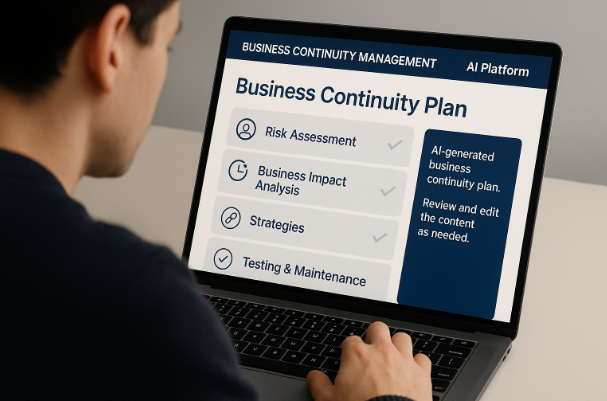
Thinking about ditching your business continuity consultant for a shiny new AI tool? Hold on.
While AI is making waves across every industry, business continuity management isn't just another process you can automate away. Sure, AI can crunch numbers and spot patterns, but when your operations are on the line, you need more than algorithms—you need human expertise.
Here's why AI alone won't cut it for business continuity planning:
When crisis hits, you need someone who can think on their feet, not just follow pre-programmed responses. AI lacks the nuanced judgment and real-world experience that seasoned professionals bring to the table, especially when facing unprecedented situations.
Think about it. Business continuity decisions often involve tough ethical choices, stakeholder prioritization, and value-based trade-offs. Should you prioritize customer data over employee safety protocols? How do you balance shareholder interests with community impact? These aren't math problems. They're human decisions that require accountability to real people.
Every organization has its own DNA—unspoken norms, internal politics, and cultural quirks that shape how things actually get done during a crisis. AI might understand your org chart, but does it know that the CFO and operations manager haven't spoken in months? Or that your remote team in Austin handles pressure differently than your headquarters staff?
This organizational context is crucial when designing response protocols that people will actually follow when things go sideways.
Most AI systems learn from historical data, but what happens when you face something completely new? COVID-19 caught everyone off guard—there was no playbook for global supply chain disruptions combined with remote work mandates and shifting consumer behavior.
Similarly, recent challenges like sudden tariff changes, widespread immigration enforcement, or urban wildfires created unique disruption patterns that didn't exist in training datasets. When your business faces its own "black swan" event, you need human creativity and adaptability, not just pattern recognition.
While AI can enhance your security monitoring, it's not foolproof. AI systems can introduce their own vulnerabilities—from biased algorithms to exploitable weaknesses that bad actors might target. Plus, the extensive data collection that makes AI effective also raises privacy concerns that require careful human governance and clear policies.
AI excels at tactical execution, but it can't set your overarching business continuity strategy. Understanding your organization's risk appetite, regulatory requirements, and evolving business objectives requires human insight. When regulations change or your company pivots its strategy, you need people who can adapt your BCM approach accordingly.
Even the best business continuity plan is worthless if your team won't follow it. Successful BCM implementation requires change management, training, and stakeholder buy-in—all fundamentally human activities. You can't automate trust-building or cultural change. When employees need to embrace new protocols or emergency procedures, they need to hear from leaders they trust, not chatbots.
AI absolutely has a role in modern business continuity management. It can help with data analysis, pattern recognition, and routine monitoring tasks. But thinking it can replace human expertise is like believing GPS eliminates the need for good drivers—helpful tool, but you still need someone behind the wheel.
The most resilient organizations will be those that thoughtfully combine AI capabilities with human judgment, leadership, and cultural understanding. Your business continuity program needs both the efficiency of technology and the wisdom of experience.
So while AI can strengthen your BCM efforts, don't let anyone convince you that it eliminates the need for skilled professionals who understand your business, your people, and your unique challenges. When crisis strikes, you'll want humans in charge—not just algorithms.
